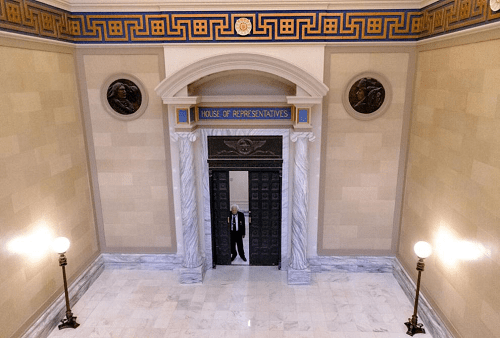
3.22.21 – KPVI
Six weeks into Oklahoma’s four-month legislative session, 70% of the pre-filed bills and joint resolutions are no longer in play.
One way or another, they failed to make one of two procedural deadlines, the second on March 11, to keep them going when the House and Senate resume work on Monday.
Bigfoot season didn’t make it. Neither did the Calf Fry Direct Sales Act.
Cannibalism will not be outlawed, at least not any more than it already is.
Out of more than 3,100 introduced bills and joint resolutions, some 2,148 have gone dormant.
More than 700 of those were unused House shell bills — placeholders with no substantive content — and many others were redundant or wound up combined with other measures.
But that still leaves a lot of legislation on the scrap heap.
As reported earlier, legislative leadership nixed all consideration of the state auditor and inspector’s recommendations concerning Epic Charter Schools, which has been ordered to repay the state $11.2 million in education funds.
Instead, the Senate adopted legislation sought by one of Epic’s founders that would allow state agencies to circumvent the auditor and inspector.
Also shelved was all legislation dealing with policing reform and deadly force. While such legislation always faced an uphill fight in the Oklahoma Legislature, the events of the past year caused some to think some movement might be in the offing.
Instead, lawmakers have favored more protection for law officers — although House Bill 2505, which would have made prosecuting law officers more difficult in cases such as the Terence Crutcher shooting, also fell by the wayside.
Also passed over were a host of measures that would have made more difficult passage of state questions, particularly those proposed through initiative petition.
These mostly involved raising the percentage of the vote required for passage, requiring the question to pass in all five congressional districts and changing the rules for gathering signatures.
Surviving measures would require some form of a fiscal impact statement on state questions and provide for recounts in close ballot issue questions. Current law allows for recounts only in elections involving candidates for office.
Lawmakers filed more than 60 election-related bills, most inspired by the heat of last year’s presidential election. Few remain active and those tend to propose relatively minor changes.
Bills that would have extended early voting by as much as a week were chucked in favor of one that would add one day for presidential elections.
Universal and automatic voter registration was quickly dismissed, but so was requiring new registrations for all voters and letting the Legislature choose the state’s presidential electors.
One measure popular with voters and some election officials — allowing absentee ballots to be verified by photo ID or voter registration card instead of notarization — didn’t seem to get much consideration.
The next cut comes at the end of March, when appropriations bills have to be out of House subcommittees.
